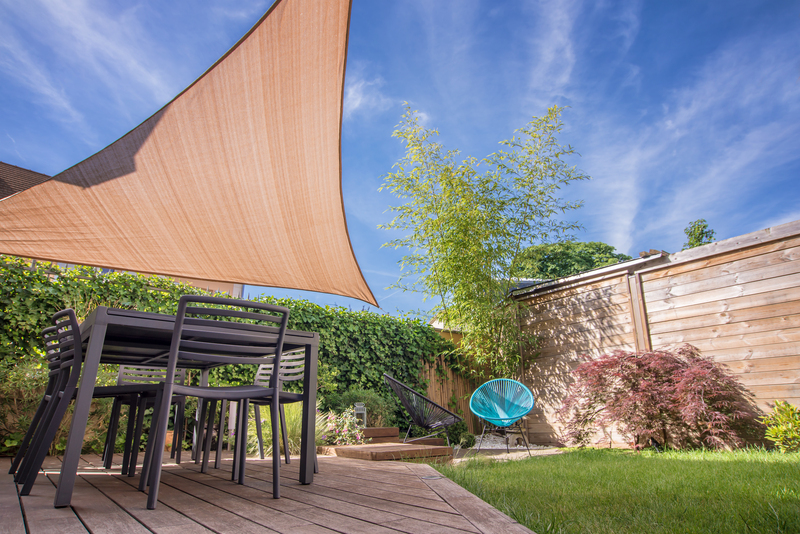Mastering the Art of Weed Control: 3 Essential Tips
Posted on 27/08/2025
Mastering the Art of Weed Control: 3 Essential Tips
Achieving a lush, healthy garden or pristine lawn often comes down to one vital task: effective weed control. Whether you're a seasoned gardener or a new homeowner, keeping invasive weeds at bay is critical to maintaining your landscape's beauty and productivity. While weeds are persistent, mastering the art of weed management is possible with the right strategies. In this comprehensive guide, we'll unveil three essential tips that will help transform your approach to weed control and provide you with the information you need to stay ahead of unwanted plant invaders.
Why Is Weed Control So Important?
Weeds aren't just unsightly -- they can rob your desired plants of nutrients, water, and sunlight, ultimately stunting their growth. Furthermore, certain invasive weeds may spread rapidly, overtaking flower beds, lawns, and even vegetable gardens. Without an effective weed management plan, your landscape can quickly become overwhelmed.
Advantages of Effective Weed Management
- Improved aesthetics: A weed-free garden immediately looks healthier and more appealing.
- Give plants a fighting chance: Reducing competition allows your chosen plants to thrive.
- Reduced pests and diseases: Many weeds harbor pests and promote plant diseases.
- Eco-friendly: Targeted weed management reduces the need for excessive chemical herbicides.

1. Prevent Weeds Before They Start
The most effective method of weed control is preventing weeds from taking root in the first place. This proactive strategy centers around eliminating their means of survival: sunlight and soil access.
Mulching: Nature's Ultimate Weed Barrier
Mulch is a gardener's best friend when it comes to organic weed suppression. Applying a generous 2-4 inch layer of organic mulch--such as shredded bark, pine straw, or compost--around your plants blocks weed seeds from germinating by denying them sunlight. Inorganic mulches, like landscape fabric or gravel, offer a similar effect.
- Conserves moisture for your plants, reducing watering needs
- Regulates soil temperature, preventing shock to plant roots
- Breaks down over time to improve soil structure (organic mulches)
Tip: Apply mulch after thoroughly pulling existing weeds to maximize its effectiveness.
Use Landscape Fabric for Persistent Problem Areas
For spaces plagued with aggressive weeds, landscape fabric can create a physical barrier beneath mulch. This discourages weed growth while still allowing water and nutrients to reach plant roots. Just remember to cut holes only where you intend to plant!
Plant Densely to Shade Out Weeds
The more crowded your garden beds, the fewer opportunities for weeds to invade. Space your desirable plants closely enough that their mature leaves will shade the soil, creating a living mulch that discourages unwanted competition.
- Covers bare soil, which weed seeds need to sprout
- Encourages healthier soil by reducing erosion
- Reduces garden maintenance over time
2. Remove Weeds Consistently and Correctly
Even with the best prevention, some weeds will find a way. The key to effective weed removal is consistency and technique.
Hand Pulling: Still the Gold Standard
Hand weeding is one of the safest and most targeted methods for removing unwanted plants--especially in vegetable gardens or flower beds where chemical use is undesirable. Always pull weeds when the soil is moist, gripping near the base and ensuring you extract the entire root system. Many weeds, especially taprooted varieties like dandelions, will regrow if even a piece of root remains.
- Pull weeds early: Younger weeds have shallower roots and are easier to remove.
- Invest in weeding tools: A hand fork, trowel, or dandelion puller can save time and effort.
- Be thorough: Leave no root fragments behind to prevent re-sprouting.
Hoeing: Fast and Effective for Larger Areas
Hoeing works well for annual weeds in garden beds. Use a sharp hoe to slice weeds just below the soil surface, ideally on a dry day--this allows uprooted weeds to wither and die on the surface. Hoes can also be used to disrupt weed seedlings before they become visible.
- Best for loose, open soil (use caution around established plants)
- Quickly covers large areas, saving you time
- Repeat weekly for optimal weed suppression
Tackle Weeds Before They Seed
A single weed can produce thousands of seeds, perpetuating weed problems for years. Make a habit of removing weeds before they flower and set seed. Regular monitoring--ideally during every gardening session--makes weed control manageable.
3. Use Targeted Herbicide Application Wisely
In some situations, using an appropriate herbicide can be a valuable part of an integrated weed management strategy--especially when dealing with stubborn perennial weeds or invasive species. The key? Use herbicides judiciously and as a last resort.
Select the Right Herbicide
There are two main types of weed killers:
- Pre-emergent herbicides: These are applied to soil to stop weed seeds from germinating. Use them in early spring before weeds appear.
- Post-emergent herbicides: These weed killers target actively growing weeds. Many are formulated for specific types of weeds (broadleaf vs. grasses).
Tips for Safe and Effective Application
- Read the label: Always follow manufacturer instructions to the letter.
- Spot treat only: Apply herbicides directly to weeds rather than broadcasting, to minimize risk to desirable plants and pollinators.
- Monitor weather: Avoid spraying before rainfall, which can wash chemicals into water sources or onto non-target plants.
- Protect yourself: Use gloves, eye protection, and avoid inhaling sprays.
Note: Organic herbicides, such as those based on vinegar or clove oil, are available but generally less effective for established perennial weeds. Use them for younger, tender weeds.
Bonus Tips for Mastering Weed Control
- Monitor your landscape regularly: The sooner you spot new weeds, the easier it is to eradicate them.
- Avoid disturbing the soil unnecessarily: Tilling can bring dormant weed seeds to the surface, triggering new growth.
- Don't compost mature weeds or seeds: Only add weed-free material to compost piles.
- Choose lawn grass seed blends with high density: A thicker lawn shades out weeds naturally.
- Consider ground covers: Plants like creeping thyme or ajuga can act as living mulch in hard-to-weed areas.
Common Weed Control Mistakes to Avoid
- Letting weeds grow too large: The bigger the weed, the harder it is to remove.
- Ignoring the root system: Many perennial weeds re-sprout if the root isn't fully removed.
- Overusing herbicides: Reliance on chemicals can damage your soil and beneficial organisms.
- Neglecting maintenance: Weed management is an ongoing process--which pays off in plant health and garden appearance.
Integrating Sustainable Weed Management Practices
The most successful weed control strategy combines multiple techniques. Embrace prevention, manually remove invaders promptly, and use chemical controls only when necessary. This integrated approach not only keeps weeds in check but also supports a healthier garden ecosystem for years to come.
Summary: Mastering Weed Control in Your Garden or Lawn
Understanding and applying these three essential tips--prevention, proper removal, and smart use of herbicides--will set you on the path to a thriving, weed-free landscape. While weed control requires vigilance and effort, the rewards are well worth it: robust plants, productive gardens, and outdoor spaces you can truly enjoy.

Frequently Asked Questions about Weed Control
-
How often should I weed my garden?
Weeding once a week during the growing season is ideal. Regular inspection prevents weed infestations from getting out of hand. -
Are organic weed control methods effective?
Yes, techniques like mulching, hand pulling, and dense planting can control most common weeds without chemicals. -
What are the benefits of using mulch to prevent weeds?
Mulch blocks sunlight, conserves moisture, and improves soil--making it a top method for weed suppression. -
Can I use household products like vinegar for weed control?
Household vinegar may kill young weeds but isn't effective on mature, deep-rooted varieties. Use with caution near desirable plants.
Conclusion: Achieve Weed-Free Success
Mastering the art of weed control requires patience, strategy, and persistence. By focusing on prevention, diligent removal, and careful product use, gardeners and homeowners alike can build a resilient, beautiful landscape. Remember, every weed pulled today prevents thousands tomorrow. Commit to these essential tips, and enjoy the satisfaction of a weed-free garden all season long!
Latest Posts
Transforming Organic Scraps into Enriched Soil for Thriving Gardens
Essential Gardening Tools Every Outdoor Enthusiast Needs
Reviving a Neglected Garden: Your Starting Point
Unlocking Nature's Secrets: 9 Must-Know Gardening Tips for Rookies

